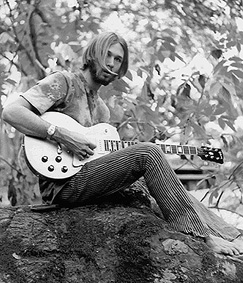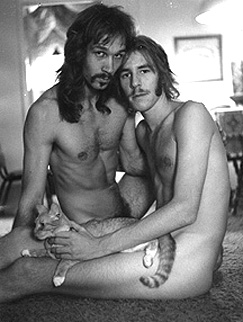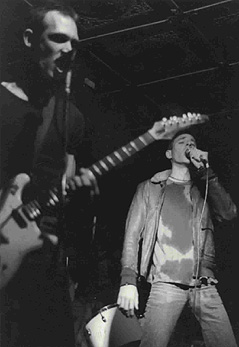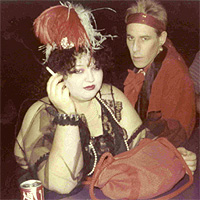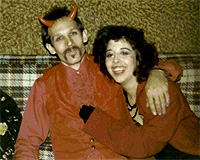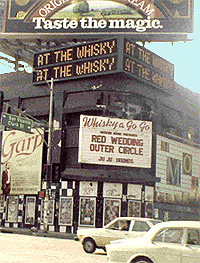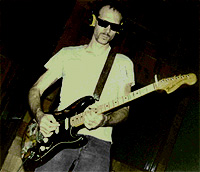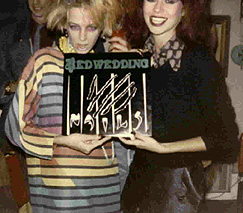biography...
OF RED WEDDING
|
|
|||||
|
"The Tracers
have two lead singers, one who looks like Little Lulu and another
who tries to look funny-weird instead of funny-ha-ha. Who knows?
They'll probably do an album and be around forever. However, when
I learned to draw, tracing was cheating."
"Hey Taxi's
high-strung music is laced with anger and hostility. It is expertly
executed with precise calculation. On stage, singer Michael Ely
displays his true showmanship as he assumes authoritarian control
of the front lines while Spider Taylor jams away at his guitar like
an axeman extraordinaire. Drummer George Hurly beats the living
life out of his skins and Jim Kaiser puts in his two cents worth
by tenaciously strumming away on bass."
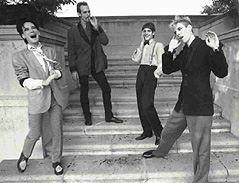 " After
a period of original punk bands getting bigger or breaking up or
left in holding patterns, it now seems that L.A. is creating a new
generation of post-punk modern music groups. Possibly spurred on
by the success of Wall Of Voodoo, or hoping to ride on the
crest of New Romantic faddism, there are definitely more original
bands happening around town. Some names to watch for: Interpol,
Kommunity FK, Red Wedding, Aphotic Culture.... whether I like
these bands or not, I respect them for having the courage to find
their own direction instead of being apes or sheep. "The Brave
Dog, October, 1981. Black walls, steel plating along the bar and
stage, dining-room chairs upholstered in leopard skin. I'm talking
with a petit-guignol punkette named Kristina. Eyes saucered like
a lemur's in heat, angular to the point of anorexia, Ritt Plum Dye
#12 dandelion-going-to-seed 'do like a nimbus around her Ensor-expressive
face, she looks like the prima screema in some pop-corn schlock
shock-o-rama, Attack of the Zombie Nymphettes, say, or something
equally bizarre. Someone catches her attention. "Oh, Miiiichaeeellll,"
she banshees, the syllables sliding off her miniature oil slick
of a voice. "Hey," she urges, "just look at that guy move!" The
l'homme fatale in question is one Michael Ely, lead singer for the
Romantidelic quartet Red Wedding. Michael's backside is currently
twitching its uppity way toward the Dog's rear exit. "See that,"
says Kristina. "That's the walk of a star!" "Don't you mean Superstar?"
I wonder, invoking the famous Warhol label. Kristina laughs. "Yeah,
the atmosphere's like that, like the Factory, isn't it? All these
intense creative types coming out from under the rocks and asking
us to pay attention."
"Red Wedding
comes across as an imaginative, intelligent Rimbaud-goes-techno
band, taking influences from the British new romantic sense of the
fatale, Eno's mastery of rhythm and technique, and a gutsy
rock 'n' roll energy that steers the band clear of pretentiousness.
The songs are tightly constructed with abrupt changes of tempo and
strong dramatic tensions. New drummer Ford has given the band a
needed rhythmic cutting edge, integrating nicely with the dense
textures of Marc O's keyboards and Tagliavia's bass. Taylor's guitar
is the high point, spinning back and forth between rhythm and melodic
lead, counterpointing Ely's intoned vocals and giving the material
its hooks. The band is more than the simple sum of it's parts and
the overall blend has character and originality. Ely is the center
of attention, a lanky, nervous type playing the doomed romantic.
Deliberately affected, his ingrained ennui is interesting for a
couple of songs, but becomes a little tiresome, particularly as
he is so detached from the audience. More emotional involvement
rather than icy aloofness with the material would draw the spectator
into the music. Given the brevity of their set, Red Wedding was
very impressive, both in terms of material and arrangements."
"Red
Wedding is too down to earth to be associated with the stylistically
vapid posing that came out of the brief New Romantic fad. Yet the
band loves to wear makeup, dress in red and black and possesses
a lyricism that moves its approach beyond bland new wave or routine
hard-rock pockets. In other words, the group doesn't fit a trend.
The band isn't on anybody's wagon, but literally in a world of its
own. Ely has always been concerned with what Marc O describes as
taking romantic themes and twisting them into ugliness. Ely might
have written the ("this is romance") chorus from "Pink
Night Mirrors" before anyone heard of Spandau Ballet or
Steve Strange, but that didn't stop the trendies from sneering.
Actually if you listen closely, you're more likely to hear influences
that range from the Beatles to Bowie than riffs copped
from Duran Duran. "Red
Wedding is a band in great balance. Their look resembles early
Stones with much more street-trash mystery. Though makeup and earrings
abound, the hard rock they play is tough and masculine. This balance
of image and sound makes for intriguing performance. Their enthusiastic
following is a large mix-up of girl teeny-boppers, punk rockers,
regular Joes, and gays of every stripe. Another guitar master, Spider,
is at work here. He has justifiably been compared to Hendrix because
of his amazing range and control. Hard-driving propulsion is provided
by loud and fast bass player, John. Lead singer Michael, who often
seems to be looking you straight in the eye, adds an earthy style.
The songs are well assembled and real to the core. It comes as a
surprise to no one that Red Wedding is rapidly becoming one of the
biggest club acts in town. They will headline the Whiskey
on August 5th."
"Red
Wedding's record is an offbeat disc of slightly postpunk dance
rock. There are traces of Bryan Ferry in Ely's sometimes
droll, sometimes melodramatic crooning while the music runs in eccentric
grooves of guitar rifts and synthesizer washes. There are some really
nice ideas here with dynamic hooks and chances (especially on
"Sleeping on the Airplane"), but the sound doesn't always play
up their strengths, pointing towards a vagueness in direction. " "Red
Wedding, a well-established, unclassifiable band has brought
forth a record ["Up and Down the Aisle" ]. From the cover
art to the complex production of the music inside, the project is
afire with style and intensity. It's one of the first truly original
records to come out of Los Angeles in quite a while. The material
is uncommonly strong, extremely well-produced and highly recommended."
"Southern
California now plays host to an entire bevy of postpunk bands which
rival anything that's coming out of England at the moment. Red
Wedding is one of the best of the bunch. Combining an absurdist's
eyeview with a funky rhythm section on their record "Up and Down
the Aisle," this band plays music which is reminiscent of
Devo one minute and Psychedelic Furs the next. "Sleeping
on the Airplane" could be a big dance club hit." "Red Wedding
has now committed five of their songs to vinyl in this interesting
if rather self-conscious EP. Led by singer Michael Ely, Red Wedding
explores an area of modern art-rock dance music that bows to influences
from various directions. There's more than a touch of The Doors
in songs like "Marsha in Pictures," especially at the end
where the organ weaves around the track, and a lot of Spider Taylor's
guitar work resurrects good old psychedelia. Ely's vocals also owe
to artists like Bryan Ferry, in that they're more a matter of attitude
than aptitude, and often he's less than convincing. However, on
the whole, his delivery is suitably idiosyncratic and tortured,
matching the lyrics which are, for the most part, provoking and
fresh."
"I would
like some synthesizer bands if they would just cut that dance beat
for a second. These guys reach brilliance on one cut of their new
EP, "Twist," which gets nice and noisy, but the other songs
are too long, too slow or too disco." "L.A. Bowie-damage
heroes Red Wedding have a new EP, and it's a giant step forward
for them. Horny idol / guitar wiz Spider Taylor takes over
this time to great effect, mixing it in with Marc O's head-spinning
synthesizer commotion and some tough bass-drum rhythms. The songs
on "Nails" come in a New Wave style, with quasi-metal rifferama
sneaking in on "Goddess No More" and a punkerama velocity
goose called "Twist." Those cuts and "Satan in Cologne"
leap out at the dance club crowd with precision. "Bernardo"
is the fantastic Ely poetry blitz, most unusual in the mixed-up
vocals near the end, and overall a fine rendition of one of Red
Wedding's older, gay-themed numbers. "
"Red
Wedding's new EP is here at last and it's gooooood! In case
you've never heard them, Red Wedding is sort of psychedelic, sort
of dancey, sort of mystical, sort of bat cavish, sort of.....well,
get the record and figure it out for yourself. Especially recommended
is "Goddess No More" and "Under the Veil." send this
record to David Bowie immediately, and let's hope we don't
have to wait for two years to get the next one."
|
|||||
|
©2001,
Michael Ely, James Taylor |
Like collaborators Patti Smith and Lenny Kaye or Bryan Ferry and Phil Manzanera, the combo of James ("Spider") Taylor and Michael Ely became more than the sum of their parts. The two met in the summer of 1971 to become not only lovers and soul mates but musical collaborators. Spider was 20, Michael was 18: To trace the history of Red Wedding, one must begin here.
Spider, who joined his first band at the age of 12, played guitar in a variety of hard rock, glam and country bands in Southern California throughout the '70s. He recorded a single with the band Emperor for RCA, an album with Delaney Bramlett and even performed as an entertainer at Barbra Streisand's A Star Is Born premiere party in Westwood. A major talent, Spider's masterful playing inspired many to compare him to Jimi Hendrix. An amateur luthier to boot, he once made over a cheap Sears guitar into an instrument evoking the envy (and offers to buy it) of many fellow guitarists.
Michael spent most of the '70s sitting on the sidelines like the faithful musician's wife he was. Highly creative and in need of an outlet, he often wrote poetry and song lyrics. He and Spider collaborated on their first song in 1975. It was called "Fiction Theater."
Coming from an ultra-conservative home in Orange County in which rock 'n' roll was banned, Michael grew up listening to Broadway musicals and artists such as Tony Bennett and Barbra Streisand. It was Spider who introduced him to rock music. The lanky young Streisand fan quickly became obsessed with avant-garde artists such as David Bowie, Lou Reed, Iggy Pop and Patti Smith (though Babs always remained a favorite).
In the early '70s, Michael was going to Rodney Bingenheimer's discotheque on Sunset Blvd. to dance to "glitter music" with friends, and by the late '70s, he was entrenched in the burgeoning punk rock scene. In 1979, he urged Spider to leave the world of overblown rock and join a Pasadena-based punk group, The Tracers, as a second guitarist. A frequent fixture at band rehearsals, Michael did not go unnoticed. Lynn, the band's singer, thought Michael had great presence and persuaded him to join the group as a back-up vocalist. During that time, the band recorded the single, "My My Girl" / "Itchy Bugs."
After a handful of shows, animosity developed between Michael and lead singer Lynn, and so Spider and Michael left the Tracers to form their own band, Hey Taxi.
Hey Taxi's lineup consisted of Spider on guitar, Michael on vocals, George Hurly on drums and Jim Kaiser on bass; the music was hardcore and angry. Michael's idea was to keep all the songs at two minutes or under (an idea later "borrowed" by The Minutemen). This allowed the band to play as many as 15 songs in a fast and frenzied 30-minute set. The lyrics, written by Michael and Spider's cousin Jeff Anderson, were both comical and dark, detailing such topics as serial killers, cannibalism, torturing dogs, and gay vampires. Hey Taxi's first performance was at the Hong Kong Cafe in downtown Los Angeles on October 15, 1979. At first, the band floundered, until another band, Party Boys, took them under their wing and introduced them to the Downtown art / loft scene. Soon Hey Taxi gained an enthusiastic and hardcore following in the L.A. area, playing at Jacaranda's Place, The Londoner, Blackies and Hong Kong Cafe with such bands as New Marines, Fender Buddies, Why Nut, Vox Pop and their pals, Party Boys. They also established a foothold in the burgeoning underground East L.A. scene where they shared the stage with such bands as The Brat and The Undertakers.
The highlight of Hey Taxi was Spider's fierce guitar playing and Michael's over-the-top stage antics: drenching himself in beer, dancing on table tops, pulling down stage curtains and wearing them like dresses, stroking the microphone stand between his legs and going down on Spider's guitar ala David Bowie and Mick Ronson. One reviewer referred to Michael as "a schizophrenic cartoon... likable and funny one minute, dangerous and menacing the next."
In 1980, Hey Taxi recorded one single for Mystic Records ("I Hate Dogs" / "War Is Hell" / "Queen Bee"). It was reviewed by only one magazine, Music Connection, which described it as, "Raunchy with some fun, but as a Sex Pistols rival, Hey Taxi turn the gun on themselves."
By the spring of 1980, Hey Taxi was playing to packed houses every other Saturday night at the Hong Kong Cafe. As the band became increasingly popular, Michael became besieged by stage fright. Shy and insecure by nature, uncomfortable in crowds, Hey Taxi's lead singer began to suffer from panic attacks. By the beginning of summer, Michael would no longer perform and the band broke up. George Hurly went on to play drums in the Minutemen; Jim Kaiser joined Ray Campi and his Rockabilly Rebels.
Within a short couple of months, and at Spider's urging, Michael felt relaxed enough to perform again. The two set out to rebuilding Hey Taxi adding new members Louie Dufau on drums and John Buccola on guitar (substituting guitar rifts for bass). The new Hey Taxi debuted at the Hong Kong Cafe in September of 1980. After a couple of shows, Buccola was replaced by John Tagliavia. Soon after, Marc O joined the group on keyboards.
Spider, John and Marc were all working at that time as doormen at a notorious gay gloryhole club, very popular before AIDS became known. John and Marc became lovers for a brief time, and Michael and Marc quickly became best friends.
Hey Taxi played a handful of shows (including opening night at the Brave Dog, a small underground club opened by Spider and Michael's good friends, Clare Glidden and Jack Marquette), but Michael's heart was no longer in the band. He was tired of punk rock, tired of singing silly lyrics, tired of playing the part of a clown. It was time for a major change. In early 1981, Hey Taxi disappeared and Red Wedding was born. More than Hey Taxi with a name change, Red Wedding was an entirely new band that would soon take on a life of its own......
Michael's concept for Red Wedding was to blend '60s psychedelia with '70s glam rock, creating a sound that was anything but retro. He wanted to create a band of illusion in which nothing was what it appeared to be. The songs would all be love songs, but with a lyrical twist: lush and romantic on the surface, cynical and decadent underneath. This new "post punk" music would explode upon the scene and, under the banner "alternative rock," continues to reverberate into the new millennium.
Red Wedding debuted at the Brave Dog on Saturday, June 13, 1981. Fans expecting a revamped Hey Taxi were in for a shock. Gone was the angry and fast-paced power punk, replaced with mysterious, trance-like electro-glam rock. Gone was Louie Dufau, replaced with a drum machine. Gone was the punk attire, replaced with ruffled tuxedo shirts, makeup and earrings. And in the biggest transformation of all, gone was Michael the hyperactive clown, replaced with Michael the dark and aloof doomed romantic.
Primarily because of their glamorous look and exotic apparel, Red Wedding was immediately labeled New Romantic, a term the band neither embraced nor rejected. It was only one of many incarnations the band would go through over the next few years. Also, because all the members of the band were openly gay, they were labeled a "gay band." Matt Groening, creator of "The Simpsons"), back then, a struggling writer for the low-rent L.A. Reader, used this label to dismiss their music in a fairly derisive manner. The L.A. Weekly, meanwhile, referred to them several times as "the brides of red rock." Although the band member's sexuality played a part in their music and in Michael's lyrics, it was not intended as gimmick. They did not want to make an issue out of their homosexuality, nor did they want to deny it. It was simply who they were.
Red Wedding performed many shows at the Brave Dog, sharing the stage with other post-punk bands and artists such as the Fibonaccis, Interpol, Kommunity FK, Wild Kingdom (Michael's personal favorite) and Adore O'Hara. They occasionally played at other small clubs around town (Madame Wong's, Al's Bar, Cathay De Grand), but they regarded the Brave Dog, the setting for Andy Warhol's 1982 "pictorial of punk" for Rolling Stone, as their homebase. Even when the band was not performing, they could always be seen hanging out at the Dog, often sharing a late night supper and some laughs with Jack and Clare at the Atomic Cafe right next door.
During that summer of 1981, a scene from the movie "I'm Dancing As Fast As I Can" was filmed inside the Brave Dog. If you look closely behind the actors, you can see the members of Red Wedding standing on the stage, flagged on each end by two girls (Belissa and Ann Marie) in red gowns. This was a kick for all concerned. Also that summer, record producer Kim Fowley approached the band about managing them. While the members were flattered, Fowley wanted too much artistic control and the band turned him down. Instead the band opted for Claudia Miles , a far less seasoned veteran but one more in sync with the band's vision. Claudia was a young, gifted writer who had worked as a publicist and club booker in the music scene since the age of 18. She had done publicity for such diverse acts as Prince (doing publicity with Bobbi Cowan for his first album, "Dirty Mind," on Warner Bros.); John Mayall (Regency Records/MCA); Fear, then managed by former lead singer of Three Dog Night, Danny Hutton; and the European pop-techno band Wet Picnic. She had booked local clubs including the hardcore punk club, The Vex in East L.A. and the more pop/new wave club The Arena in Culver City where The Go-Gos played some of their first gigs. She was smart, aggressive and eager to move Red Wedding into the larger venues.
Claudia quickly became part of the band gestalt. More than most bands, the members of Red Wedding were a tight-knit family. They seemingly spent all their time together, intimately involved in each other's lives on every level. When they went to clubs or bars, it was usually as a group. They tended not to socialize with members of other bands, preferring to keep to their own small circle of friends.
Michael was by far the most antisocial of the group. He suffered severe panic attacks when out in public and often drank excessively to mask the fear. Although he loved the attention of being in a band, it was, at the same time, a curse. He was petrified when people would approach him, and both Spider and Claudia went to great lengths to protect him. In large part, his aloof and often intense onstage theatrics were a device designed to keep people at a distance. If people viewed him as cold and sinister, they would leave him alone (he hoped). Most people never saw the real Michael, who his close friends knew as sweet, funny and fragile.
After the Brave Dog closed down in November, Red Wedding ventured into larger venues. In early '82, they changed their unconventional lineup (two guitars, synthesizer and drum machine) to a more traditional one. Drummer Brian Ford replaced the drum machine and John switched from guitar to bass. This gave the band a new energized, full-bodied sound, and after a stunning performance on New Wave Theater (filmed on March 9th, Michael's birthday), audiences and critics began to take notice.
In June of 1982, Red Wedding recorded their first EP entitled "Up and Down the Aisle." It was a disaster from start to finish, despite the talents of producer Thom Wilson (who has since achieved great success in the music business). Recorded on a shoe-string budget in the middle of the night (literally) in a studio out in the San Fernando Valley, the band was ill prepared to transfer their live sound onto vinyl, and there were technical problems with the band's equipment, leaving less than three hours to record and mix the five songs. Michael's vocals were recorded in less than 20 minutes, and his idea to leave his vocals completely raw and without effects did not work on vinyl. However, had it not been for Thom's quick thinking ideas and studio savvy, things could have been much worse, and the experience of working with Thom (although brief) was a joy for the band.
The recordings were signed over to Bemisbrain Records, an extremely small punk/alternative label. Within minutes after signing, the band had regrets, but decided to move forward and learn from the experience.
In July, Red Wedding replaced drummer Brian Ford with drummer Brian Engel. Ford, who had been the only heterosexual in the band, was never comfortable with the "gay thing," and had become increasingly difficult to work with. Engel, also heterosexual, was more than happy to join the band. His first performance with Red Wedding was to take place in a gay bar.....
Jim Van Tyne asked Red Wedding to play at the first Theoretical, a unique musical event. It took place on Sunday afternoon, July 25 at the One Way bar, less than a block from Spider and Michael's apartment in Silverlake. The stage was built of beer cases and plywood. For this occasion, most of the band wore leather and Michael, a long peach-colored negligee. The show was a huge success, assuring there would be many, many more Theoreticals to follow.
Red Wedding continued to play at various clubs including The Whiskey, Club Lingerie, The Plant, The Anti-Club, Madame Wong's West and The Lhasa Club, sharing the stage with bands such as the Ju Ju Hounds, Outer Circle, Mnemonic Devices, 45 Grave, Redd Kross and The Bangs (later renamed The Bangles). Down south in San Diego, Red Wedding played at the Spirit Club and the Bacchanal Club with such bands as Killing Joke, X, Nina Hagen, Romeo Void, The Gun Club and Bow Wow Wow.
In November, Bemisbrain Records released "Up and Down the Aisle." To the band's surprise, it was for the most part praised by the reviewers, but many fans of Red Wedding complained that the record didn't sound anything like them, and the EP did poorly in sales. It was later released in Europe on a French label, New Rose, where it faired much better.
In January of 1983, Michael began to see a psychiatrist to help him overcome his panic disorder and bouts of severe depression. The psychiatrist told him his fears and depression were rooted in his homosexuality, and put him on a high dose of Lithium. Michael mixed the Lithium with street drugs and alcohol, causing his behavior to become erratic and irrational. While staying with friends down in San Diego one weekend, he went into convulsions and had to be held down under a cold shower. After this incident, he stopped seeing the psychiatrist.
As with most bands, drugs, sex and rock 'n' roll were a way of life with the members of Red Wedding. They worked hard and they played hard, often burning the candle on both ends, and took full advantage of the sex and drugs that are readily made available to those in bands. Of course, this fast-paced lifestyle eventually took its toll on all of them.
In February of 1983, Claudia announced she would no longer manage the band. She was dealing with her own personal demons and needed to focus her energies on recovery from drug and alcohol abuse as well as depression. This was a decision that was hard for her to make and harder to carry out; letting her best friends down was excruciating. Her departure also left the band devastated. Not only were they losing a manager, but a member of their family. It was a loss that they never fully recovered from.
In the spring of 1983, Red Wedding played their second Theoretical ( a special birthday bash for good friend Jim Van Tyne). Held in an 8,000-square-foot warehouse and using the back of a 30-foot flatbed truck as a stage, Red Wedding performed along with Age of Consent, Lotus Lame and John Fleck. Over 1,000 people showed up.
Throughout 1983 and into 1984, Red Wedding continued to play clubs in L.A., Orange County, San Diego and San Francisco. They began incorporating more and more diverse, and often conflicting elements into their music, combining psychedelia, punk, gloom, funk and pop all into one evening's set. Accordingly, they began to change their look with every show. From '60s mod to black leather, from pink suits to boots and trench coats, from choir robes to bathrobes, the band never seemed to repeat the same look twice. Michael bleached and dyed his hair so many times that it began to fall out, and in one memorable show at the Whiskey, he appeared wearing only a shower curtain, hooks and all.
This unpredictable approach to their music and attire both delighted and angered critics and fans. Always difficult to categorize, it was now virtually impossible to label Red Wedding. While some praised Red Wedding for refusing to follow any one trend, others criticized the band for having no clear direction.
In July of 1984, Red Wedding recorded their song "Swimming" for the "Radio Tokyo Tapes - Volume Two" compilation album, and music soundtracks for two Al Parker gay porn movies. That August, long time friend Billy Ingram became the band's second manager, and bassist John Tagliavia was replaced with Warren Mansfield (due to John's problems with excessive drug use).
In September, Red Wedding recorded their second EP, "Nails." It was produced by Leslie St. James and recorded in both San Diego and L.A. For this EP, Red Wedding decided to focus on their darker, homo-erotic material, although it was decided to delete the most blatant homosexual passages used in the live version of the song "Bernardo."
"Nails" was released in late October of 1984 on Important Records. Reviews were mixed, but the EP made it to number one on many collage radio stations across the country, and the song "Somewhere" won the 91 X people's choice poll in San Diego.
In November of 1984, John (his problems now somewhat under control) rejoined Red Wedding, and in December, Marc O left the group to start his own band (one that never materialized). Marc left on friendly terms, and he and Michael continued to be best friends.
Without Marc's domineering keyboards, the focus fell entirely on Spider's guitar playing, allowing him to shine like never before. The band had a new, lean sound. For hardcore fans, this was Red Wedding at its best, but Red Wedding's heyday was at an end. Audiences began to dwindle and bookings became scarce. The band began to lose heart, and Michael became more and more reclusive, often not showing up to rehearsals.
In March of 1985, Red Wedding recorded four songs (including "Fiction Theater," the first song Spider and Michael had written together back in 1975) for their third untitled EP. Produced by Ed Grundman and Rick Hart, this was by far Red Wedding's best and most important work, but the EP was never completed.
In May of 1985, Red Wedding gave its final performance playing at the Spirit Club down in San Diego. After four years with no interest from a major label, frustrated with having to deal with the jaded Hollywood scene, and burnt out from drugs and alcohol, Red Wedding called it quits. In 1987, Spider and Michael resurfaced briefly in a band called "Glass," but Michael no longer wanted to perform, and he and Spider retired from music in 1988.
On January 5,1992, Marc O passed away due to AIDS complications. Michael and Spider were by his side to the end. Marc's memorial service was held at the old Hollywood Cemetery (the same cemetery in which Red Wedding had posed for their first professional band photo 11 years earlier). John Tagliavia passed away from AIDS a year later. Sadly, he had been estranged from Spider and Michael since the band breakup.
Today, Michael and Spider are living in Arizona, northwest of Tucson. They both love the desert and still write and play songs for their own enjoyment. As of December 2001, they will have been a couple for 30 years. Spider works as a structural mechanic in a jet factory, and Michael takes care of the homefront. Michael is now in counseling and on appropriate antidepressants, but his days of mixing prescription drugs with excessive amounts of drugs and alcohol are long over. Still very much the recluse, and occasionally still troubled by mood swings, he has found a contentment that eluded him in the past. Nevertheless, his and Spider's experiences in Hey Taxi and especially Red Wedding remain close to his heart - the music, the people, the sheer adventure of it all - the two of them will never forget.

